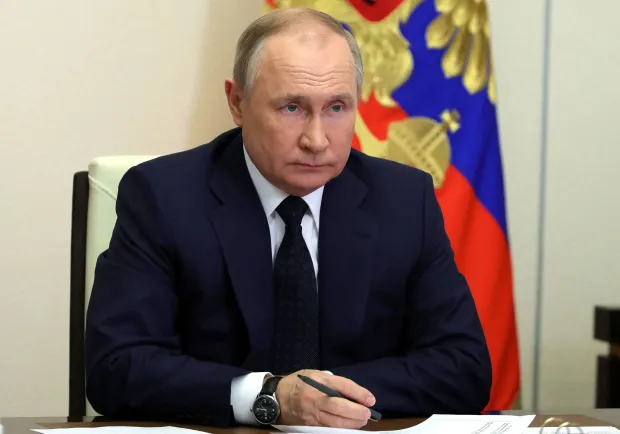Obukhovychi and Termakhivka, two tiny settlements near the Chernobyl exclusion zone, spoke of their experiences under the Russian occupation. Despite the tragic events in Bucha and Western leaders’ condemnation of Vladimir Putin for war crimes, Moscow has continued to launch heavy attacks on Ukraine, and evidence of additional crimes against civilians has emerged.
A guy from Obukhovych spoke to the BBC’s Jeremy Bowen about the awful events that he and his family had to face after Russian military arrived in their village.
“People here are traumatised by the Russian occupation,” he claimed.
“Russian mines have destroyed bridges and obstructed roadways.”
“Civilians, including children, have been utilised as human shields at the nearby school,” he stated.
“Russians are thugs and fascists.” They aren’t actual people.”
A young guy from Termakhivka also recalled being targeted after occupying soldiers learned that his younger brother participated in the Ukrainian Army.
“Young guys have been imprisoned like captives for nearly 15 days,” he added.
“I was shot because my younger brother is a member of the Ukrainian army battling Russia.”
Another woman described her experiences under the Russian occupation in greater detail.
Maria said that, having survived the Second World War, her life under Russian rule was no different from her life under German captivity.
“They [the Russian forces] were like the Germans, but I could understand what they were saying,” the woman explained.
Despite the UN Security Council meeting convened in reaction to the horrific events in Bucha and Putin’s charge of war crimes, new proof of Russian wrongdoing has surfaced.
According to Ukrainian officials, over 30 towns and villages have been freed since the Russian Army was forced to flee after failing to penetrate Kyiv for over a month.
The world community was outraged by the treatment of inhabitants in Bucha, 23 miles northwest of the city, after proof of summary slaughter of civilians was revealed.
Locals’ bodies were found in the streets after being shackled and shot in the back of the heads, according to photos and videos taken in the town.
There were reports of mass graves being discovered, and Ukrainian MP Kira Rudik claimed to have observed “torture cells” being used to gather information from Bucha inhabitants.
The world community was outraged by the treatment of inhabitants in Bucha, 23 miles northwest of the city, after proof of summary slaughter of civilians was revealed.
Locals’ bodies were found in the streets after being shackled and shot in the back of the heads, according to photos and videos taken in the town.
There were reports of mass graves being discovered, and Ukrainian MP Kira Rudik claimed to have observed “torture cells” being used to gather information from Bucha inhabitants.
Obukhovychi and Termakhivka, two tiny settlements near the Chernobyl exclusion zone, spoke of their experiences under the Russian occupation. Despite the horrific events in Bucha and Western leaders’ condemnation of Vladimir Putin for war crimes, Moscow has continued to launch significant strikes on Ukraine, and proof of other atrocities against civilians has surfaced.
A guy from Obukhovych spoke to the BBC’s Jeremy Bowen about the awful events that he and his family had to face after Russian military arrived in their village.
“People here are traumatised by the Russian occupation,” he claimed.
“Russian mines have destroyed bridges and obstructed roadways.”
“It was the commotion, the sobbing children.” “Everyone was sobbing,” the guy added, alluding to the ordeal they had to through following the entrance of the Russians.
“Civilians, including children, have been utilised as human shields at the nearby school,” he stated.
“Russians are thugs and fascists.” They aren’t actual people.”
A young guy from Termakhivka also recalled being targeted after occupying soldiers learned that his younger brother participated in the Ukrainian Army.
“Young guys have been imprisoned like captives for nearly 15 days,” he added.
“I was shot because my younger brother is a member of the Ukrainian army battling Russia.”
Another woman described her experiences under the Russian occupation in greater detail.
Maria said that, having survived the Second World War, her life under Russian rule was no different from her life under German captivity.
“They [the Russian forces] were like the Germans, but I could understand what they were saying,” the woman explained.




















